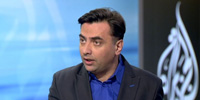ISIL demands ransom for Japanese hostages
Group releases video demanding $200m for release of two men and condemns Japan’s aid to Iraq and Syrian refugees.

The Islamic State of Iraq and the Levant group has released a video threatening to kill two Japanese hostages unless they receive $200m in 72 hours, directly demanding the ransom from Shinzo Abe, Japan’s prime minister, during his visit to the Middle East.
The video, identified as being made by ISIL’s Al-Furqan media arm and posted on Tuesday on websites associated with the group, resembled other hostage threats it has made.
Keep reading
list of 4 itemsAustin confirms Russians deployed to airbase housing US military in Niger
What’s next as ‘heavy-handed’ US negotiates pullout from Niger?
Putin says ‘radical Islamists’ behind Moscow concert hall attack
Japanese officials said they would analyse the tape to verify its authenticity, though Abe has pledged to free the men while speaking to journalists in Jerusalem.
| Analysis: Imran Khan, Iraq correspondent | ||
There two key things to remember when it comes to this particular demand. ISIL runs a very smart PR operation and they knew that a demand for such large amount of money would be covered globally by the media. This means that ISIL keep their name in the media, and it allows for them to send a message to supporters and sympathisers that ISIL is the only group in town worth following. It’s part of a PR war between ISIL and its main rival, al-Qaeda. ISIL wants to show that al-Qaeda isn’t an organisation that functions as a whole or even effectively, and that they are struggling. For example al-Qaeda in the Arabian Peninsula has called for more “lone wolf” attacks on Western interests. They see an attack like the one on French magazine Charlie Hebdo as great publicity and they would like to see more attacks like it. The rivalries between the jihadist groups is being fought through the statements that they release and with each group vying to get headlines. Quite simply more headlines means more support, and therefore more legitimacy. It is highly unlikely that Japan or any other country would pay $200m in ransom, but ultimately that doesn’t matter. ISIL have the headlines. That’s worth more to them.
|
“Their lives are the top priority,” he said.
Abe and other Japanese officials declined to discuss whether they would pay the ransom for captives Kenji Goto and Haruna Yukawa, though their armed forces generally only operate in a self-defence capacity at home.
Goto, a freelance journalist, was abducted while reporting on Syria’s civil war last year. Yukawa, a private military contractor, was kidnapped in Syria last August.
The kidnapping also recalled the 2004 beheading of a Japanese backpacker in Iraq, carried out by ISIL’s predecessor al-Qaeda in Iraq, over Japan’s involvement in the US-led war there.
“It is unforgivable,” Abe said as he wrapped up a six-day visit to the Middle East. “Extremism and Islam are completely different things.”
Masked man in black
In the video, the two Japanese men appear in orange jumpsuits with a rocky hill in the background, a masked man dressed in black standing between them.
The scene resembles others featuring the five hostages previously beheaded by ISIL, which controls a third of Iraq and Syria.
“To the prime minister of Japan: Although you are more than 8,000 and 500 kilometres from the Islamic State, you willingly have volunteered to take part in this crusade,” the masked man, brandishing a knife, said.
The man resembles and sounds like a British fighter involved in other filmed beheadings.
“You have proudly donated $100 million to kill our women and children, to destroy the homes of the Muslims … and in an attempt to stop the expansion of the Islamic State, you have also donated another $100 million to train the [apostates].”
ISIL’s comments probably refer to money Abe pledged while in Egypt to help Iraq’s government and aid Syrian refugees.
Abe said he would send Yasuhide Nakayama, a deputy foreign minister, to Jordan to seek the country’s support and to resolve the hostage crisis.
He also said the Israeli government, which Japan promised on Sunday to cooperate with on counterterrorism, is sharing information to help tackle the hostage crisis.
The Israeli prime minister’s office declined to comment.
ISIL has beheaded and shot dead hundreds of captives – mainly Syrian and Iraqi soldiers – during its sweep across the two countries, and has celebrated its mass killings in extremely graphic videos.
The group also beheaded James Foley and Peter Kassig, American hostages; Steven Sotloff, an Israeli-American; and David Haines and Alan Henning, British captives.
